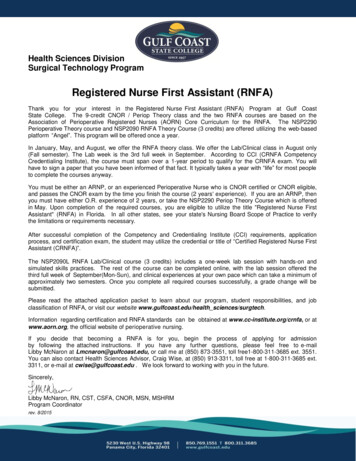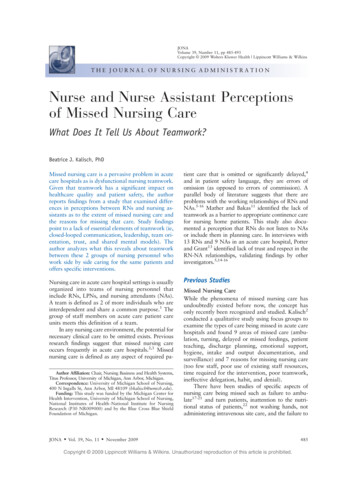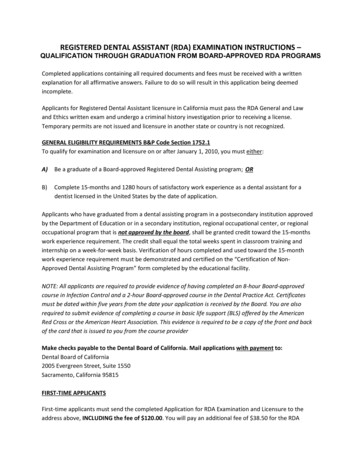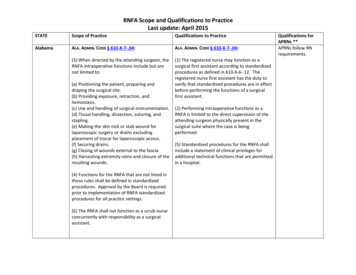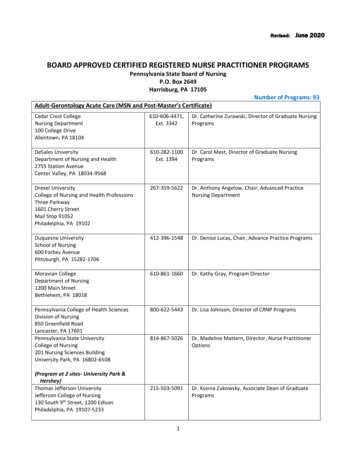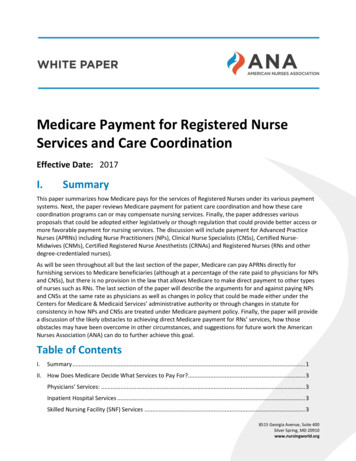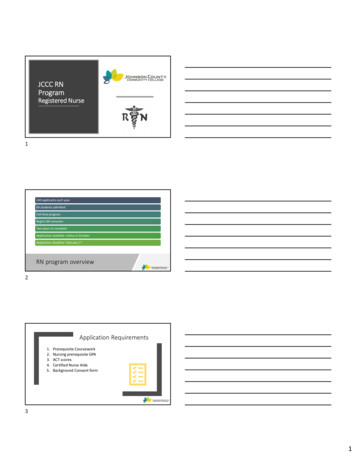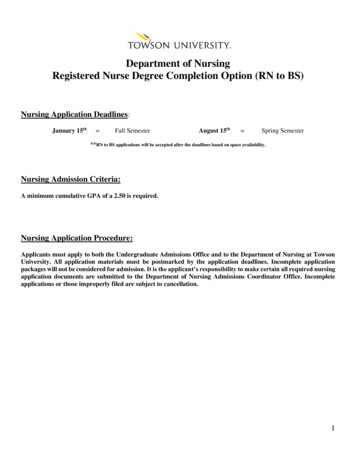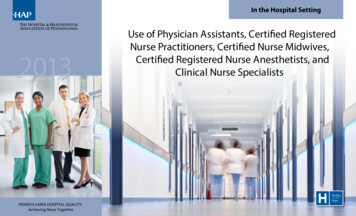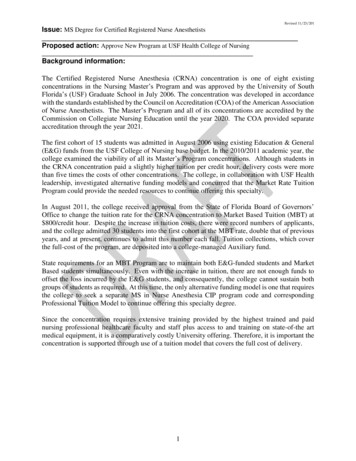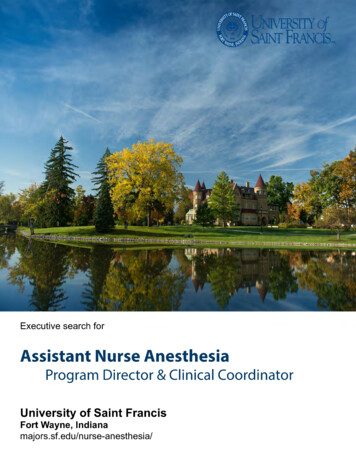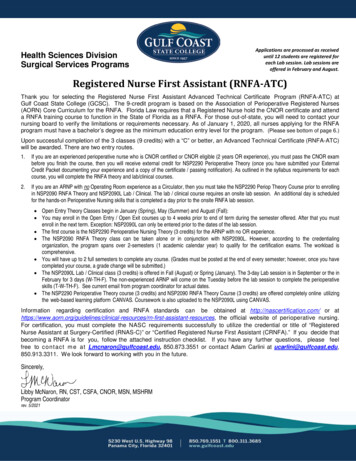
Transcription
Health Sciences DivisionSurgical Services ProgramsApplications are processed as receiveduntil 12 students are registered foreach Lab session. Lab sessions areoffered in February and August.Registered Nurse First Assistant (RNFA-ATC)Thank you for selecting the Registered Nurse First Assistant Advanced Technical Certificate Program (RNFA-ATC) atGulf Coast State College (GCSC). The 9-credit program is based on the Association of Perioperative Registered Nurses(AORN) Core Curriculum for the RNFA. Florida Law requires that a Registered Nurse hold the CNOR certificate and attenda RNFA training course to function in the State of Florida as a RNFA. For those out-of-state, you will need to contact yournursing board to verify the limitations or requirements necessary. As of January 1, 2020, all nurses applying for the RNFAprogram must have a bachelor’s degree as the minimum education entry level for the program. (Please see bottom of page 6.)Upon successful completion of the 3 classes (9 credits) with a “C” or better, an Advanced Technical Certificate (RNFA-ATC)will be awarded. There are two entry routes.1.If you are an experienced perioperative nurse who is CNOR certified or CNOR eligible (2 years OR experience), you must pass the CNOR exambefore you finish the course, then you will receive external credit for NSP2290 Perioperative Theory (once you have submitted your ExternalCredit Packet documenting your experience and a copy of the certificate / passing notification). As outlined in the syllabus requirements for eachcourse, you will complete the RNFA theory and lab/clinical courses.2.If you are an ARNP with no Operating Room experience as a Circulator, then you must take the NSP2290 Periop Theory Course prior to enrollingin NSP2090 RNFA Theory and NSP2090L Lab / Clinical. The lab / clinical course requires an onsite lab session. An additional day is scheduledfor the hands-on Perioperative Nursing skills that is completed a day prior to the onsite RNFA lab session. Open Entry Theory Classes begin in January (Spring), May (Summer) and August (Fall): You may enroll in the Open Entry / Open Exit courses up to 4 weeks prior to end of term during the semester offered. After that you mustenroll in the next term. Exception: NSP2090L can only be entered prior to the dates of the lab session. The first course is the NSP2290 Perioperative Nursing Theory (3 credits) for the ARNP with no OR experience. The NSP2090 RNFA Theory class can be taken alone or in conjunction with NSP2090L. However, according to the credentialingorganization, the program spans over 2-semesters (1 academic calendar year) to qualify for the certification exams. The workload iscomprehensive. You will have up to 2 full semesters to complete any course. (Grades must be posted at the end of every semester; however, once you havecompleted your course, a grade change will be submitted.) The NSP2090L Lab / Clinical class (3 credits) is offered in Fall (August) or Spring (January). The 3-day Lab session is in September or the inFebruary for 3 days (W-TH-F). The non-experienced ARNP will come on the Tuesday before the lab session to complete the perioperativeskills (T-W-TH-F). See current email from program coordinator for actual dates. The NSP2290 Perioperative Theory course (3 credits) and NSP2090 RNFA Theory Course (3 credits) are offered completely online utilizingthe web-based learning platform CANVAS. Coursework is also uploaded to the NSP2090L using CANVAS.Information regarding certification and RNFA standards can be obtained at http://nascertification.com/ or es/rn-first-assistant-resources, the official website of perioperative nursing.For certification, you must complete the NASC requirements successfully to utilize the credential or title of “RegisteredNurse Assistant at Surgery-Certified (RNAS-C)” or “Certified Registered Nurse First Assistant (CRNFA).” If you decide thatbecoming a RNFA is for you, follow the attached instruction checklist. If you have any further questions, please feelfree to c o nt ac t m e at Lmcnaron@gulfcoast.edu, 850.873.3551 or contact Adam Carlini at ucarlini@gulfcoast.edu,850.913.3311. We look forward to working with you in the future.Sincerely,Libby McNaron, RN, CST, CSFA, CNOR, MSN, MSHRMProgram Coordinatorrev. 5/2021
DIVISION OF HEALTH SCIENCES MISSION STATEMENTThe Division of Health Sciences strives to maintain high levels of academic and clinical standards while providing the allied healthcommunity with effective and highly motivated professionals who are committed to interprofessional collaboration and sensitivity tocultural diversity. This goal is to be achieved by meeting the diverse needs of all students through academic advising, recruiting,counseling, and innovative teaching and learning strategies.PROGRAM MISSION AND PURPOSEThe faculty of the Surgical First Assistant program strives to promote the development of well-educated entry-level surgical firstassistants who are motivated and productive professionals capable of utilizing knowledge-based critical thinking in the safepractice of surgical technology and surgical assisting. These goals are to be achieved by meeting the diverse needs of studentsthrough recruiting, academic advising, counseling, continuous program improvement, collaborating with an active communityadvisory board, and staying abreast of current technology along with innovative and engaging teaching and learning methods.PROGRAM INSTRUCTIONThe surgeon at the facility serves as the primary mentor at all times regarding surgical practicum instruction. Didactic and handson lab session experiences are provided by licensed surgeons, master’s prepared nurses, certified registered operating roomnurses, certified surgical technologists, certified surgical first assistants, and other experienced staff as appropriate to the task orskill level of instruction for both the ARNP with no OR experience and CNOR surgical students. Surgeon Mentor, CRNFAPreceptor, or RNAS-C Preceptor to student ratio for SFA clinical cases will be one to one for all surgical procedures in the firstassistant role. The program responsibilities include teaching, supervision, evaluation, and providing feedback andrecommendations. The licensed surgeon or CRNFA/RNAS-C will provide guidance and instruction for all experiences to meet theSurgical Assistant requirements for graduation as appropriate to the skill / task or level of instruction required for the situation.SURGICAL ASSISTANT PROGRAM OF STUDYThe course of study is composed of 3 courses or CNOR status and 2 courses which take approximately 2 – 3 Semesters (9 – 12months) to complete. The program requires the student entering the program to be either a CNOR-eligible registered nurse or anadvanced registered nurse practitioner. Upon successful completion of this National Assistant at Surgery Certification approvedprogram, the RNFA student will receive a RNFA-advanced technical certificate and be eligible to sit for the national certificationexamination to become a Registered Nurse Assistant at Surgery-Certified (RNAS-C). The program prepares students to becomeeligible for employment as a Surgical Assistant in the Operating Room setting. With further experience, students may becomeeligible to sit for the CRNFA exam also offered by the National Assistant at Surgery Certification organization (NASC). See theAORN, CCI, and NASC web sites for further information.The goal of the program is to prepare competent entry-level Surgical Assistants in the cognitive (knowledge), psychomotor (skills),and affective (behavior) learning domains. The program prepares students by providing didactic, lab, and clinical experiences thatmeet the level of preparation as defined by the Association of Perioperative Nurses Core Curriculum for the Registered Nurse FirstAssistant. The education of surgical assistants for the practice of surgery encompasses education in basic sciences, training incognitive and technical skills, development of clinical knowledge, and maturity in the acquisition of surgical judgment. Ourgraduates are prepared to immediately serve patients and surgeons in any routine entry-level surgical setting. Laboratory andclinical experiences will address specialty equipment.See each course syllabus to identify specific core objectives, graduation hour requirements (190 Hours Course requirement whichincludes a minimum of 120 intraoperative hours / 140 perioperative hours RNAS-C requirement) and outcome goals.2
RNFA Program - Student ChecklistApplicant ResponsibilitiesStep 1. New students should apply for General Admission to GCSC. Applications are available online pplication-type.html. Choose the Major Code "RNFAATC.” Returning students who have not attended GCSC in the last year must reapply for admission.Step 2. New students must pay the 10 non-refundable college application fee. You can pay online throughmyGCSC (Lighthouse) at https://mygcsc.gulfcoast.edu, in-person at the Business Office or Bookstore, or by callingthe Business Office at 850.872.3879 to pay with a credit card. Note: This must be paid in order to register forcourses. Cost is subject to change.Step. 3. Request OFFICIAL high school transcripts or GED equivalent with scores AND your OFFICIALCollege transcripts from all colleges attended and have them mailed to Enrollment Services at GCSC. DONOT SEND TO PROGRAM COORDINATOR. Per the State of Florida rules, evidence of high school graduationdate must be on file to exit the program successfully. Transcript request forms are available on the GCSC websiteat tml.Step 4. Submit the following items via mail to Gulf Coast State College, Health Sciences, Attn: Adam C a r l i n i ,5230 W est U . S . H i g h wa y 98, Panama City, Florida 32401, or in person to Room 200 Health Sciences, or by faxto 850.747.3246, or by e-mail attachment to HealthSciencesGCSC@gulfcoast.edu. RNFA application form (Found in this packet) Two (2) letters of recommendation attesting to the applicant’s experience as an RN and theapplicant’s knowledge, judgment, and skills specific to perioperative patient care. Current color identification photograph (passport photo, please) Duties Acknowledgement Form (Found in this packet) Student Planning Guide (part of this packet) Verification of Eligibility for Program (Found in this packet)a. Baccalaureate degree with CNOR or CNOR eligible (copy of CNOR certificate orattached CNOR eligibility form) Certification must be submitted before a successful programcertificate of completion can be issued. Must have a minimum of 2 years recentperioperative nursing experience demonstrated in the scrubbing and circulating roles. Thosewho are not CNOR certified will have an additional abbreviated module to complete toprepare for the CNOR exam. If unable to satisfactorily complete the module, the student maybe required to complete NSP2290 to continue in the program.b. Board certified or board eligible as an advanced practice registered nurse (APN).APNs without competence in intraoperative patient care must register for and complete theNSP2290 Perioperative Nursing online course. In the State of Florida, you may be required tocontact your State Board of Nursing for clarification regarding this specialization if you are noteligible for the CNOR certification. Skills include scrub, gown, closed glove, sterile fieldmaintenance, equipment and sterilization competency, AORN standards as evidenced by arequired core knowledge exam and onsite check-offs. Verification of Employment (Found in this packet) Copy of current CPR card: must be American Heart Association BLS Healthcare Provider CPRcard. (This certification must be maintained throughout entire time enrolled in program.)Copy of ACLS card, if available. Copy / Proof of licensure to practice as a registered nurse in the state in which clinical internshipwill be experienced (Copy voided RN license or proof of licensure as per state policy) Copy of Resume / Curriculum Vitae (CV)Step 5. Give 2 people you know the Personal Reference Forms (enclosed) to complete. Be sure to print yourname and sign the top section giving them permission to fill out the form. References can be from a pastor,family friend, former teacher, or current/past employer. As stated on the forms, the person completing the formshould mail it to GCSC, Attn: Health Sciences – Adam Carlini, 5230 West U.S. Highway 98, Panama City, Florida32401.3
Register for CoursesNSP2090 RNFA Theory or NSP2290 Perioperative Nursing as applicable to your situation:Step 6. Contact Libby McNaron, Lmcnaron@gulfcoast.edu or 850.873.3551 with questions and for aninitial advising meeting to evaluate application and get signed up for classes. (If you are anAPRN who is not CNOR eligible, discuss your responsibilities to take the additional courses. Contactyour Board of Nursing to make sure there is nothing else you need to do with the nursing board.)If a Clinical Planning Packet has not already been sent to you, one will be sent at this time.Step 7. Pay for the courses that you're registered in. You can pay online through myGCSC (Lighthouse) athttps://mygcsc.gulfcoast.edu, in-person at the Business Office or Bookstore, or by calling the BusinessOffice at 850.872.3879 to pay with a credit card.Note: Fees not paid by due date will result in being dropped from class. If this happens, you will need toenroll again. If you enroll after the Semester starts, you MUST pay the same day you are registered.Step 8. From the GCSC website, www.gulfcoast.edu, click myGCSC (just to the left of the search bar) tolog into CANVAS. Follow the directions to access the site. You must complete at least one assignmentevery week to remain active in the program. If you will be “absent” for a week, you must contact theinstructor to discuss your options.Preparation for Clinical InternshipStep 9. Select a Surgeon Preceptor that meets the clinical component requirements as outlined in theStudent Syllabus. The clinical component is a minimum 190 hours of clinical experience including thehours of Lab completed during lab week. 120 hours must be intraoperative FA time (incision todressing) or arrange with GCSC and the facility to begin the process of affiliation as required by thefacility. See O.R. Manager Facility planning guide.Submit the Surgeon Mentor approval form (part of the Clinical Planning Packet previouslye-mailed to you).Submit the Clinical Planning Guide (part of the Clinical Planning Packet previously e-mailed to you)with proof of clinical privileges from the healthcare facilities to be used, contact name foran affiliation agreement, or copy of your job description outlying your scope of practiceas a RNFA in training on-the-job.Note: It is the student’s responsibility to ensure that all facility procedures regarding credentialing requirements(clinical privileges), or other policies regarding student internships, are accurately followed including health, etc.NSP2090L RNFA LAB / CLINICAL CLASS each yearStep 10. Successfully enroll in the didactic component of NSP2090 RNFA, and maintain a “C” or better. Youmust complete at least one assignment every week to remain active in the program. If you will be “absent”for a week, you must contact the instructor to discuss your options.Step 11. Prior to registration for NSP2090L, follow the directions in the clinical planning packet (previouslye-mailed to you) and the conditional acceptance packet. You will need to submit the following forms toenroll in the Clinical Course Lab.Submit evidence of current personal professional liability insurance for RNFA practice.Submit Clinical Facility Clearance Form and SFA Job Duties Form (both part of theClinical Planning Packet previously e-mailed to you),ORSatisfactory criminal background check completed per instructions you will receivefrom GCSC and complete the following per CastleBranch instructions.1. GCSC Physical Examination Form with satisfactory results. (upload)2. GCSC Immunizations Form completed and signed by a healthcare professional.(upload)3. Satisfactory 10-panel drug screen as required by clinical site.Step 12. Log-in to "CANVAS" NSP2090L and submit the SURVEY to communicate your level of experienceand identify your preferences so that we can tailor the experiences to meet your needs.Preparation for Lab Class:Step 13. Complete Modules 1-3 in preparation for the Lab session.Step 14. Lab classes are scheduled in both F ebruary and September.4
FEE SCHEDULE **REGISTERED NURSE FIRST ASSISTANT (RNFA)In-StateOut-of-StateENROLLMENT FEES:GCSC - application fee (New students)Background CheckCastleBranch: Drug Screening/Compliance TrackerVaccinations/Physical Exam/Flu Shot-Varies 10.00 85.00 60.00 PRN 120.00 PRN 10.00 85.00 60.00 PRN 120.00 PRN* Varies by provider 450.00 TEXTBOOK FEES:Textbooks - approx. (list provided)Required textsAORN Core Curriculum for theRNFA AORN Standards for the Current Year450.00*Purchased through www.aorn.orgTUITION FEES: (See current College Catalog)NSP 2290 Periop Nursing - APT eligible only (3 crs.)NSP 2090 (3 credits)NSP 2090L Lab/Clinical (3 credits)Distance Education Fee 296.25 ( 98.75 cr hr.)296.25296.25270.00 1,079.13 ( 359.71 cr. hr.) 1,079.13 1,079.13 270.00LAB FEES:NSP 2090L 265.00(Includes: Student Liability/Accident Insurance for Lab)Total Program Fees (approx.) 265.00 2,148.75 4,497.39Textbooks include:1.2.3.4.RNFA Core Curriculum (AORN) required text - Order online from AORN.AORN Standards and Recommended Practices for current year by AORNAlexander’s Care of the Patient in Surgery, current editionEssential Surgical Techniques by R.M. Kirk, Current Edition.Other Texts Recommended: (Core Perioperative Knowledge)1.2.3.4.Atlas or Anatomy detailed text of Surgical Anatomy and Physiology; e.g., Netter's Clinical AnatomyFor APRN with no surgery background: Berry and Kohn’s Operating Room TechniqueAssisting in Surgery by Rothrock (RNFA),Textbook by AORN (Order online if available; not required.)Highly Recommended:a. Surgery Textbook (your preference), e.g., Sabiston or Schwartz, or if you are a specialty such asb. Neuro Surgery, specific surgical texts for your specialty.c. RN First Assistant Guide to Practice Optional (an AORN Publication) is a good introductory book.** Fees listed above are currently accurate, but subject to change without notice due to pricechanges from the other requirements, manufacturer, or provider.5
Gulf Coast State College DisclosuresThe Higher Education Act (HEA) of 1965 is a federal law which authorizes student aid programs.Reauthorizations of this act prescribe disclosure requirements for institutions wishing to participate in thefederal student aid program. As a prospective student or enrolled student of GCSC you have a right tothe following consumer and safety information. Paper copies of this information will be provided uponrequest to the financial aid office. General disclosures, including GCSC's report on athletic program participation rates andfinancial support data, is found at: consumer-information.html Information on financial aid available to students is found at: https://www.gulfcoast.edu/tuitionaid/financial-aid GCSC's annual Security Report is found at: clery-act.html The Family Educational Rights and Privacy Act is found PPORTUNITIES FOR REGISTERED NURSES TO EARN A BACHELOR’S DEGREE ATGCSCFor those interested in the RNFA program but not having earned a Bachelor’s degree already, there areat least two different bachelor’s degrees at Gulf Coast State College that would be available (and,hopefully, of particular interest) to you as a healthcare worker.The first, naturally, is our BSN program (only for students articulati
a RNFA training course to function in the Stateof Florida as a RNFA. For those out -of-state, you will need to contact your nursing board to verify the limitations or requirements necessary. As of January 1, 2020, all nurses applying for the RNFA program must have a bachelor’s deg
